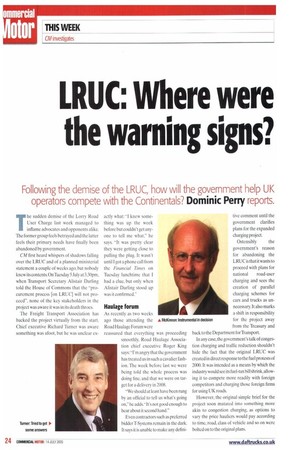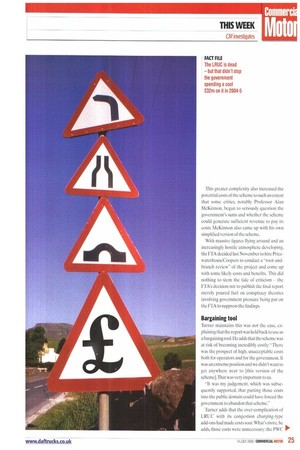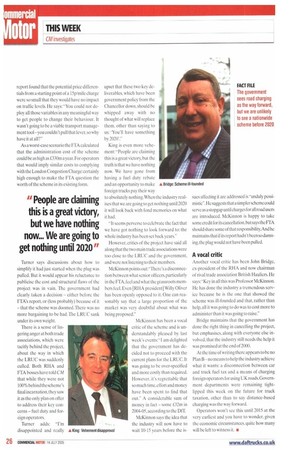LRUC: Where were the warning signs?
Page 24

Page 25

Page 26

If you've noticed an error in this article please click here to report it so we can fix it.
Following the demise of the [RUC, how will the government help UK operators compete with the Continentals? Dominic Perry reports.
The sudden demise of the Lorry Road User Charge last week managed to inflame advocates and opponents alike. The former group feels betrayed and the latter feels their primary needs have finally been abandoned by government.
CM first heard whispers of shadows falling over the LRUC and of a planned ministerial statement a couple of weeks ago, but nobody knew its contents. On Tuesday 5July at 3.30pm, when Transport Secretary Alistair Darling told the House of Commons that the "procurement process [on LRUCI will not proceed", none of the key stakeholders in the project was aware it was in its death throes.
The Freight Transport Association has backed the project virtually from the start. Chief executive Richard Turner was aware something was afoot, but he was unclear ex actly what: "I knew something was up the week before but couldn't get anyone to tell me what," he says. "It was pretty clear they were getting close to pulling the plug. It wasn't until I got a phone call from the Financial Times on Tuesday lunchtime that I had a clue, but only when Alistair Darling stood up was it confirmed."
Haulage forum
As recently as two weeks reassured that everything was proceeding smoothly. Road Haulage Association chief executive Roger King says: "I'm angry that the government has treated us in such a cavalier fashion. The week before last we were being told the whole process was doing fine, and that we were on target for a delivery in 2008.
"We should at least have been rung by an official to tell us what's going on," he adds "It's not good enough to hear about it second hand."
Even contractors such as preferred bidder T-Systems remain in the dark. It says it is unable to make any defini Live comment until the government clarifies plans for the expanded charging project.
Ostensibly the government's reason for abandoning the LRUC is that it wants to proceed with plans for national road-user charging and sees the creation of parallel charging schemes for cars and trucks as unnecessary. It also marks a shift in responsibility for the project away from the Treasury and back to the Department for Transport.
In any case, the government's talk of congestion charging and traffic reduction shouldn't hide the fact that the original LRUC was created in direct response to the fuel protests of 2000. It was intended as a means by which the industry would see its fuel-tax bill shrink, allowing it to compete more readily with foreign competitors and charging those foreign firms for using UK roads.
However, the original simple brief for the project soon mutated into something more akin to congestion charging, as options to vary the price hauliers would pay according to time, road, class of vehicle and so on were bolted on to the original plans. This greater complexity also increased the potential costs of the scheme to such an extent that some critics, notably Professor Alan McKinnon, began to seriously question the government's sums and whether the scheme could generate sufficient revenue to pay its costs. McKinnon also came up with his own simplified version of the scheme.
With massive figures flying around and an increasingly hostile atmosphere developing, the VIA decided last November to hire PricewaterhouseCoopers to conduct a "root-andbranch review" of the project and come up with some likely costs and benefits. This did nothing to stem the tide of criticism — the IAA's decision not to publish the final report merely poured fuel on conspiracy theories involving government pressure being put on the VIA to suppress the findings.
Bargaining tool
Turner maintains this was not the case, explaining that the report was held back to use as a bargaining tool. He adds that the scheme was at risk of becoming incredibly costly: "There was the prospect of high, unacceptable costs both for operators and for the government. It was an extreme position and we didn't want to get anywhere near to [this version of the schemetThat was very important to us.
"It was my judgement, which was subsequently supported, that putting those costs into the public domain could have forced the government to abandon that scheme."
Turner adds that the over-complication of LRUC with its congestion charging-type add-ons had made costs soar. What's more, he adds, those costs were unnecessary: the PWC 11111' report found that the potential price differentials from a starting point of a 15p/mile charge were so small that they would have no impact on traffic levels. Ile says: -You could not deploy all those variables in any meaningful way to get people to change their behaviour. It wasn't going to be a viable transport management tool — you couldn't pull that lever,so why have it at all?"
Asa worst-case scenario the FTA calculated that the administration cost of the scheme could be as high as £330m a year. For operators that would imply similar costs to complying with the London Congestion Charge:certainly high enough to make the FTA question the worth of the scheme in its existing form.
Turner says discussions about how to simplify it had just started when the plug was pulled. But it would appear his reluctance to publicise the cost and structural flaws of the project was in vain. The government had clearly taken a decision — either before the FTA's report. or (less probably) because alit — that the scheme was doomed. There was no more bargaining to be had. The LRUC sank under its own weight.
There is a sense of lingering anger at both trade associations, which were tacitly behind the project, about the way in which the LRUC was suddenly culled. Both RHA and FTA bosses have told CM that while they were not 100% behind the scheme's final incarnation, they saw it as the only plan on offer to address their key concerns — fuel duty and foreign operators.
Turner adds: "I'm disappointed and really upset that these two key deliverables. which have been government policy from the Chancellor down, should be whipped away with no thought of what will replace them. other than saying to us: 'You'll have something by 2020'."
King is even more vehement: "People are claiming this is a great victory, but the truth is that we have nothing now. We have gone from having a fuel duty rebate and an opportunity to make foreign trucks pay their way to absolutely nothing. When the industry realises that we are going to get nothing until 2020 it will look back with fond memories on what it had. A Bridge: Scheme ill-founded It seems perverse to celebrate the fact that we have got nothing to look forward to: the whole industry has been set back years."
However, critics of the project have said all along that the two main trade associations were too close to the LRUC and the government, and were not listening to their members.
McKinnon points out:"There's a disconnection between what senior officers, particularly in the FTA, feel and what the grassroots members feel. Even [RHA president] Willy Oliver has been openly opposed to it. One can reasonably say that a large proportion of the market was very doubtful about what was being proposed."
McKinnon has been a vocal critic of the scheme and is understandably pleased by last week's events: "I am delighted that the government has decided not to proceed with the current plans for the LRUC. It was going to be over-specified and more costly than required. However, it's regrettable that so much time,effort and money have been spent to find that out.A considerable sum of money in fact — some .02m in 2004-0.5, according to the D1T.
McKinnon says the idea that the industry will now have to wait 10-15 years before the is sues affecting it are addressed is "unduly pessimistic-. He suggests that a simpler scheme could serve as a stopgap until charges for all road users are introduced. McKinnon is happy to take some credit for its cancellation, but says the FTA should share some of that responsibility.And he maintains that if its report hadn't been so damning, the plug would not have been pulled.
A vocal critic
Another vocal critic has been John Bridge, ex-president of the RHA and now chairman of rival trade association British Hauliers. He says: "Key in all this was Professor McKinnon. He has done the industry a tremendous service because he is the one that showed the scheme was ill-founded and that, rather than help, all it was going to do was to cost more to administer than it was going to raise."
Bridge maintains that the government has done the right thing in cancelling the project, but emphasises, along with everyone else involved, that the industry still needs the help it was promised at the end of 2000.
At the time of writing there appears to be no Plan B —no means to help the industry achieve what it wants: a disconnection between car and truck fuel tax and a means of charging foreign operators for using UK roads.Government departments were remaining tightlipped this week on the future for truck taxation, other than to say distance-based charging was the way forward.
Operators won't see this until 2015 at the very earliest and you have to wonder, given the economic circumstances, quite how many will be left to witness it. •










































































































































































































